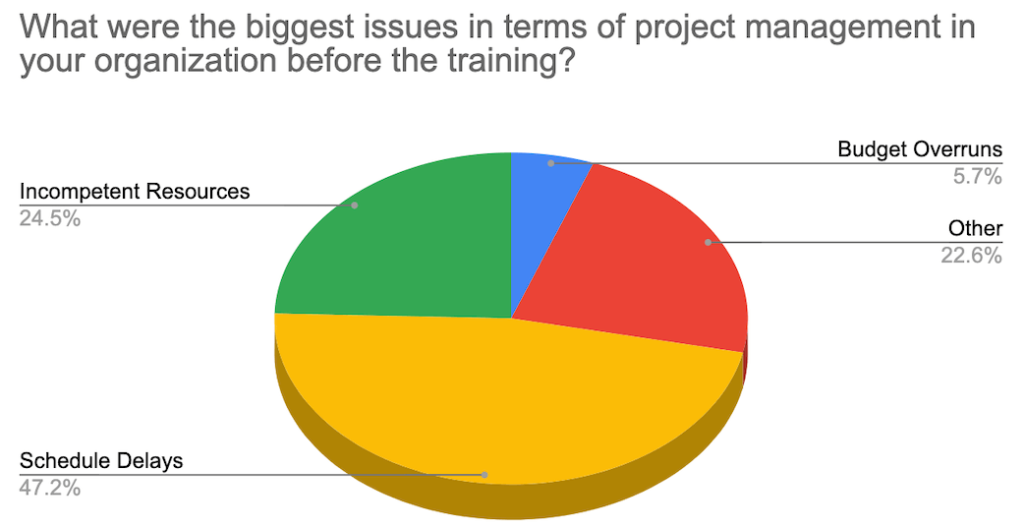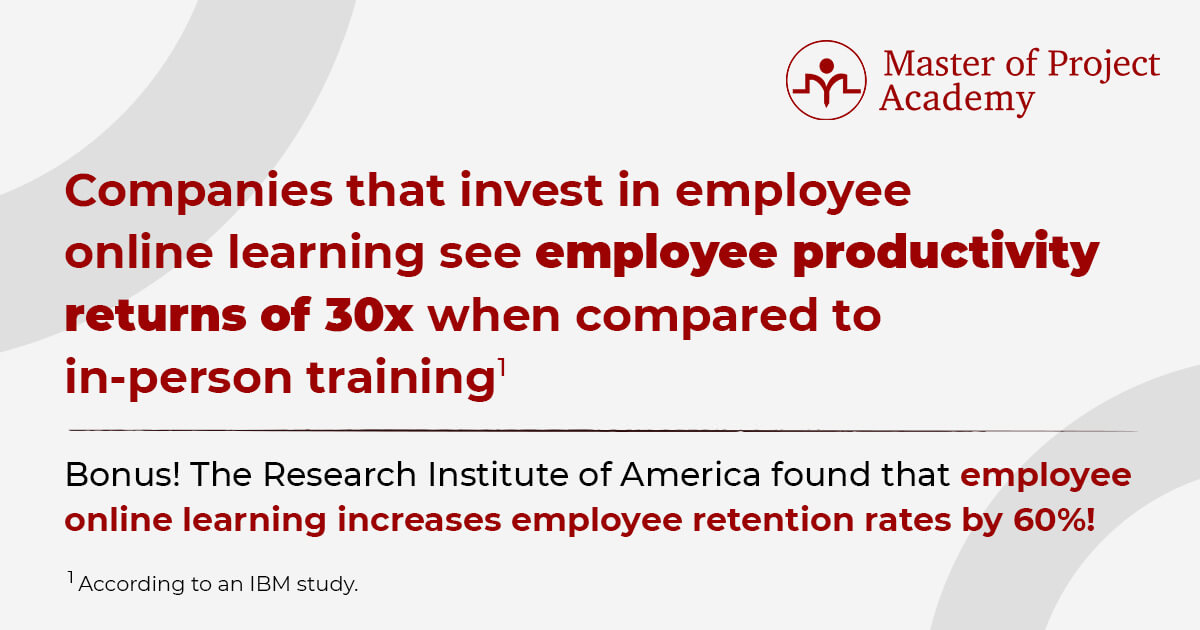In many organizations, project managers or the project management team is responsible for the project’s success. Project Management Office assigns PMs, creates processes, documents, and governance for project management. While there are several stakeholders and roles that can affect project delivery, project management roles are considered as the main accountable for project success in many organizations. However, it is a fact that non-project people or business people such as HR, Finance, Sales, and other functional roles cause significant project cost overruns or schedule delays in many cases.
We will be going over the following points about project overruns caused by businesspeople (people not directly involved in project implementation):
- Examples of project overruns caused by businesspeople
- How to prevent overruns caused by non-project people
- Improving project management competency among the businesspeople in the organization.
3 Real-World Project Overruns Caused by Business People
Master of Project Academy taught 200,000+ professionals and worked with 100+ small to Fortune 500 companies to improve project management competence among the organization. We have seen that almost in all organizations, project delivery teams are the main party who is accountable for the project’s success. Although there are several businesspeople or non-project people who can affect the project delivery or cause project overruns, only PMs or PMOs are considered accountable for project success.
We will go over three real-life project overruns scenarios caused by businesspeople or organizations. I am sure you will find these cases very similar to your experience. Note that, names and company names have been fictionalized.
1- Sales Manager Sells a Technically Undeliverable Solution Causes Project Overruns
Dave is an experienced sales manager working in Telco Pro, a telecommunication vendor. He is responsible for selling enterprise telecommunication solutions to telecom operators. At the end of the year, he realizes that he is behind his department’s sales targets. To meet the targets, he has to make sales over $400,000.
Cell Mate is a telecom operator looking to expand its telecommunication infrastructure with new networks. Cell Mate prepared an RFP (Request for Proposal) and listed the requirements needed for the project. Dave works on the bidding for this project and although one of the technical requirements cannot be met by Telco Pro’s solution, Dave prepares the quote and sends it to Cell Mate.
Based on several vendors’ offers, Cell Mate agrees to run the project with Telco Pro. Dave meets the sales targets!
Telco Pro assigns a project manager, two integration engineers, and one analyst to work on the project. The project team starts to work on Cell Mate’s premises. During the first phase closure, Cell Mates raises an issue that one of the requirements does not meet their requirements. The Telco Pro team goes over the RFP requirements and notices that the feature requested by Cell Mate needs additional feature development.

Since the project is ongoing and the team has been working for more than three months, Telco Pro agrees to develop the additional feature which costs $67,000 to develop and two months delay for the project. As you can see, although Dave managed to meet his sales targets, he also caused a budget and schedule overrun for the project.
Master of Project Academy offers virtual, in-person, and online training courses in:
- PMP® Certification Training – 35 Contact Hours Online PMP Training
- PMP® Online Class Virtual Training – 4 Days – 35 Contact Hours
- CAPM® Certification Training – 23 Contact Hours Online CAPM Training
- CAPM® Online Class Virtual Training – 3 Days – 23 Contact Hours
- PM Core™ – Project Management Training for Business
Our experienced instructors explain with real-life examples how to avoid budget and schedule overruns. By attending a PMP, CAPM, or Core PM training course, the participants will receive an in-depth understanding of how to plan, manage and control project budgets and schedules. Furthermore, participants will be able to understand triggers that might cause those overruns, will gain confidence in how to manage and mitigate issues and apply successful tools to bring the project budget and schedule back on track.
2- Human Resources Department Downgrades the Compensation Package for All Employees
BioMatter is a Fortune 500 pharmaceutical company with more than 100 offices around the world and more than 80,000 employees. Megan is managing a vaccine project. The project team consists of one R&D Scientist, two chemists, one biologist, and one medical doctor. It is a 15-month project and there are three phases in the project. The project team completed the two phases nearly on budget and on time as planned.
When the project team just started phase three, the BioMatter HR department announced a list of downgrades for the employee compensation packages such as reducing the limit of health insurance and removing the company car from employees, and allowing it only for the department managers and above.
Although there are no technical road blockers for the project, Megan sees that the project activities are delayed. She notices that the project team has been demoralized by the reduced compensation. The project is completed with a 7% deviation from the planned budget and 4 months later than the planned due date.
3- Finance Manager Approves Project Budget Late
Rosebrook is a new and highly densely populated district in Clark City. Due to the high population, water problems started in the Rosebrook district and the Municipality decided to build a new water distribution facility in 18 months.
Caroline is the Finance Manager in Municipality. The fiscal year of the municipality is ending on June 30th and since Caroline was busy with financial end-year closing, she could not approve the project budget on time. While the planned budget approval date was June 10th, Caroline could approve the budget by the 5th of July.
Since the project was initiated on the 20th of April, the budget approval process was also in the project schedule. Due to the late approval of the budget by the Finance Manager, the project is delayed for at least a month.
Note that these are real-life project overrun cases from our clients. We have trained 200,000+ professionals and I am sure you have experienced similar cases where “non-project” people caused project overruns. That is why we have launched PM Core™ – Project Management for Business People Training program to create project management awareness among non-project people.
The PMI’s research about PM competency backs up our findings. Based on PMI’s research, the project management competency of the business people in an organization can increase on-time project completion by 49% and on budget by 40%.
How to Prevent Non-Project People-Caused Project Overruns
There are several ways of preventing project overruns caused by businesspeople. We will be going over the fundamental ones.
Creating Common KPIs for the Roles Affecting Project Delivery
The Project management office is not the only one responsible for successful project delivery. PMOs may be the heart of project delivery in an organization, however, the project delivery space is end-to-end in an organization. Organizations initiate projects for different reasons. New product development, technological advancement, legal requirements, social needs, and many other things can cause projects to be initiated by organizations.
Several departments, functions, or roles might affect a project in an organization. Therefore, an end-to-end success measurement system must be in place. For instance, when Dave is selling a solution, if his proposal is missing technical requirements or requires additional development, it should affect his KPIs depending on the project delivery results he sold. Similarly, when Caroline is delaying a project budget approval, the project delay caused by her delay must affect her performance at the end of the year.
If the project overruns caused by non-project or businesspeople cannot be measured and if these overruns do not affect the business peoples’ KPIs, then, the end-to-end project success might not be ensured in an organization.
Improving Project Management Competency in the Organization
Harvard Business Review analyzed several corporate company projects. 1,471 projects were analyzed, comparing their budgets and projected performance benefits with the real costs and outcomes. Based on this Harvard Business Review (HBR) research, the average overrun was 27%, but that figure hides a far more alarming reality. Graphing the budget overruns of the projects shows a “fat tail”- a large number of gigantic overruns. Almost one in six of the projects that HBR studied was identified as a black swan, with a cost overrun of 200 percent, on average, and a schedule overrun of nearly 70 percent.
When we surveyed the 425 participants who attended our corporate training programs, schedule delays, incompetent resources, and project cost overruns are the most common issues in project delivery organizations.

These results reveal two important points:
- Almost every organization suffers from project overruns
- The top two project management issues in organizations are project overruns and incompetent resources.
Actually, project overruns and incompetent resources are cause-and-effect related to each other. The incompetent resources in an organization most probably cause project overruns.
Competence has several aspects. A software developer must be skilled in the technical aspects of the project, a sales manager must be skilled in sales, and a project manager must be skilled in project management. However, it is a fact that every role in an organization must have a fundamental level of project management knowledge.

If the sales manager is ignoring some technical requirements, he or she must be aware that it can cause project overruns. When a business analyst is not describing the project requirements in sufficient detail, he or she must be aware that there will be delays due to the lack of clear understanding about that requirement at later stages of the project. When an HR personnel is delaying an approval or entry permit for a project team, they must be aware that they might be causing some delays in that project and causing cost or schedule overruns.
Project delivery success can be achieved by enterprise-level project management awareness. That is why we have launched PM Core™ – Project Management for Business People Training program to create project management awareness among non-project or business people.
Summary
In today’s world, professions and roles are very strictly defined in many organizations. Salespeople sell products or services; however, they do not consider the after-sales or delivery cycles. Finance people focused on budgets, monetary KPIs, or metrics, and they do not consider that their delays in approvals might cause project overruns.
Enterprise-level project delivery success can be ensured if end-to-end cross-functional KPIs for project success can be placed. A project can be led by PMO or project managers, however, if there are any project overruns caused by other functions in the organization, that must be attributed to relevant roles in the organization.
Creating a common vocabulary of project management in an organization is essential. People or roles not directly engaged with the project must still have a common or basic level of project management fundamentals. This knowledge will lead to a situation where all business activities can positively impact a project in an organization.
At Master of Project Academy, we can help your organization and your employees manage successful projects. The key to successful organizations is well-trained and skilled employees. Let us train your employees and have them learn from our skilled instructors on how to apply the best project management practices. Your organization and your employees can choose from several certification training courses such as Core/Fundamental PM courses, CAPM (Certified Associate in Project Management), PMP (Project Management Professional), and many more.
- PMP® Certification Training – 35 Contact Hours Online PMP Training
- PMP® Online Class Virtual Training – 4 Days – 35 Contact Hours
- CAPM® Certification Training – 23 Contact Hours Online CAPM Training
- CAPM® Online Class Virtual Training – 3 Days – 23 Contact Hours
- PM Core™ – Project Management Training for Business
Unlock the undiscovered project delivery competence of your organization.
We’ve helped 200,000+ professionals enrolled from 100+ organizations including these reputable organizations.
We can enhance your organization’s competence too! View our corporate services and training.

